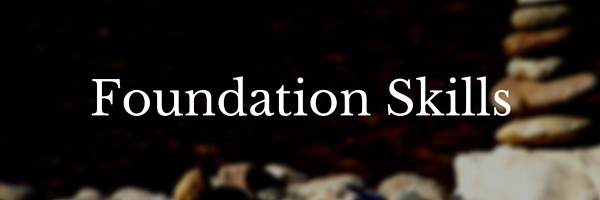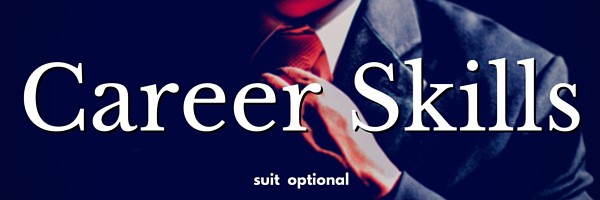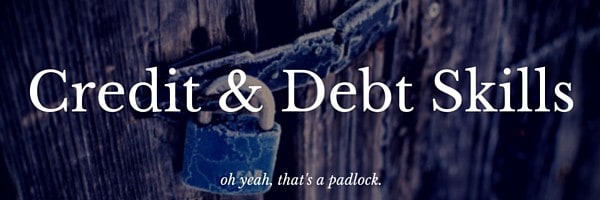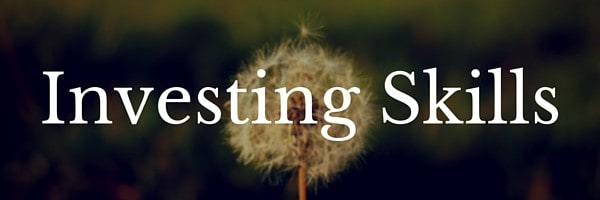I remember the first time I changed a flat tire. It was a cool fall night and I'd just left work. As I walked up to my car, I noticed something was off about how it sat.
As I walked around the car, I saw my rear passenger tire was flat. Ugh. I just wanted to go home.
At least it wasn't raining.
And it wasn't one of the front tires (it was a front wheel drive)!
And at least I knew how to change a tire! I jacked up the car, found the wheel lock in the center console, loosened the nuts, swapped out the tire with the spare, and tightened everything back up. Easy peasy, done in about 15 minutes and I remembered to take off my dress shirt so it didn’t get dirty. Whew!
There are certain skills every person should possess. CPR. How to write a thank you note. How to cook an egg. How to change a tire.
They're basic skills that will help enjoy life and be a better person.
This is no truer than when it comes to money. Years ago, when my friend Jeff Rose started the Roth IRA Movement, it shocked me to learn how many people didn't know what a Roth IRA was. Jeff was giving a talk to a packed room of college seniors and not a single one knew about Roth IRAs.
If you think about it, it's not that surprising though. How many people know how to change a flat tire on a car? Or start a campfire? It's actually a much smaller group than you'd expect.
You can go years without ever having to change a flat if you're lucky. When it comes to money skills, those years can cost you big.
A $4,000 investment appreciating at a conservative 7% will be worth $15,478.72 after 20 years. At 10%, it'd be worth $26,910.02. That's a lot of money.
Today, I want to create a list of money skills every person must know.
To help, I've asked some of my fellow bloggers for a money skill they felt everyone must know. They share theirs and include a more in-depth article from their blog that explains it. If you need help mastering these skills, I recommend you check out these experts.
- Life Skills
- Foundation Skills
- Career Skills
- Saving Skills
- Spending Skills
- Credit & Debt Skills
- Investing Skills
- Tax Skills
- Legacy Skills

- Learning the art of saying no – No to going out, no to buying that thing, no to a time commitment, etc. Learning to say NO is huge, it'll save you a lot of money and, more importantly, time so you can focus on the important things in life. Here are some great tips on how to learn the art of saying no.
- Learn to prioritize your financial health above your wants – You can start by being intentional about your financial future (like setting goals) until your intentional actions become habits. Natalie from FinanceGirl shares how she intentional living can help you make better decisions and live with fewer regrets.
- Learn to cook a few basic meals – Cooking from scratch is a great way to save money. Spaghetti & meatballs, grilled chicken and vegetables, whatever is both good and tasty (here are some places to find recipes). Have a few go-tos to impress friends, slim down your dining out budget, and slim down your waist. To kick this up to the next level, have a “signature dish” that you can make in your sleep and that is really good. (mine is Chicken Parm)
- Maintain major equipment (including you) – Ounce of prevention beats a pound of cure. Maintenance of yourself and your possessions is crucial for increasing the lifespan and regular maintenance is a good discipline to develop. First one on the list? Learn some basics for car maintenance, your most valuable piece of equipment both in price and utility.
- How to adjust your habits to fit your goals – Your habits are malleable and learning how to adjust them to your environment is a powerful skill. Financially, that means identifying what you value and adjust your habits so you're able to achieve your goals. My friend Scott saved $20,000 in a single year through this type of lifestyle design.
- How to spot a scam – Everyone needs to keep a keen eye on avoid scams. A lot of people fall victims to money scams each year because they want something that is, frankly, too good to be true. Before committing to anything like a “deal”, “assistance”, “aid”, or more, make sure you do your research. Scams tend to pop up the most when you're in the direst straits, so always be vigilant. Prime example? Student loan scams.
- Stop playing the victim – Take an active role in your finances. You'll feel empowered when you stop saying “I can't afford that” and recognize that you have choices.
- Find contentment – I think one of the best skills we can possess is contentment. Most of us live in a world where our standard of living has increased dramatically, but yet we don't realize it. John Rockefeller probably had chauffeurs to take him by horse and buggy all around town, but wouldn't you much rather be riding in a ten-year-old Chevy?

- Establish a solid financial foundation – I use two documents, a Net Worth Spreadsheet and a Treasure Map, to keep my finances straight.
- Track your net worth – J Money of Budgets Are Sexy agrees, he says “Start tracking your net worth! There's nothing more empowering (and smart) about knowing where all your money is. Take 5 minutes every month to know what your # is and then keep on hustling.”
- Automate your finances – Everyone should learn how to automate their finances – set up your savings, bills, spending and retirement allocations to function automatically. It takes away the stress of having to remember who gets paid when and how.
- Get in the habit of saving – You can automate it, which is best, or make it a game, like with a savings challenge, but get into the habit of saving early and often!
- Set up an emergency financial plan – We know about emergency funds, that's just a slug of money for a bad day, but what will you do when disaster strikes? Do you know what your bare minimum number (Jackie of Cheapsters calls it your basic number) Plan now so you don't have to decide under duress.
- Set up a regular financial meeting – Everyone wants to talk about fees, spreadsheets or technology as the answer to a better budget. But for everyone who handles money with a partner, communication is the key to success. Joe of Stacking Benjamins shares what he does during his family budget meeting, which they perfected over several years and it works.

- Apply for a job the right way – Most hiring managers have to sort through hundreds of terrible resumes and have just seconds to spot the keepers. Knowing how to make your job application stand out could double or triple the number of interviews you get.
- Craft the perfect resume – Resumes are extremely important make sure your resume is perfect.
- Negotiate a raise – It begins by knowing your worth and then demonstrating it in a way that a raise is a foregone conclusion.
- Read your paystub – Understand all line items on your paystub, are like FICA, health insurance, and other deductions. Also understanding that earned income is taxed the same, bonuses are not taxed differently but may be subject to different withholding.
- How your retirement options work – Saving for retirement can get complicated with all the different acronyms and plan types. Learn the difference between defined benefit vs. defined contribution, 401k, IRAs, etc. Spending a little time early on can pay big dividends decades down the road.
- Understand your health insurance – Whether you're enrolled for health insurance through your employer or on the open market, you need to understand how it works and what the terminology of your health insurance plan actually means. It will go a long way in helping you understand, anticipate, and ultimately save on medical costs.
- Achieving “next level” goals – There are short term goals, like saving an emergency fund, and there are longer term goals that may be years in the future and where the path forward is less clear. The Money Guy, Brian Preston, calls these “next level” financial goals and achieving them takes more than a few bullets – he explains how to prioritize and achieve next level financial goals.

- Focus on building wealth, not just saving – It's all too easy to focus on saving money, but that's just half of the equation. Building wealth is a better llong-termgoal, while saving is a short-term one. Focus on building wealth should always be on your mind.
- Creating and sticking with a budget – Whether with software like YNAB or with Excel, maintaining a budget with a surplus is a must. One of the most popular ways is what's known as a zero sum budget, where you take last month's income to pay for this month's expenses (which is how real life works). If that seems like a lot, the envelope cash system as a simpler but still effective alternative (this system is a great way to teach teens about envelope budgeting). As for sticking with a budget, I really like this idea of money chunking.
- Or if budgeting isn't your thing, there's always the anti-budget – Do you know about the anti-budget? If not, click through and let my friend Paula from Afford Anything explain it to you.
- Understanding and calculating your personal saving rate – Armed with a budget, you can now calculate your personal savings rate, which is a good measure to know.
- Make saving automatic – Become an “unconscious” saver — with rent, groceries, insurance, loans, and expensive habits, it can be difficult to save money. Still, saving remains a key factor in the road to financial freedom. Automating the savings process makes the savings decision an unconscious one. You'll thank yourself later during rainy days or when you need funds to meet a financial goal (purchasing a car, travel, etc).
- Fend off frugal fatigue – It can be very challenging, when saving money, to keep at it. It's now believed willpower is a finite resource and so it's easy to lose your frugal edge. Use these 10 tips to stay focused.
- Get a fee waived – Get dinged by a fee? Know the exact words you need to use to get a fee cancelled.
- How banks and different account types work – The differences between checking, savings, money market, and certificates of deposit.
- How ATMs work – When you'll be charged a fee, when you won't, when you can get that fee refunded., and how to find an ATM you can use that won't ding you for a fee.

- Limit impulse purchases & overspending – You need a plan to prevent overspending because impulse purchases can destroy a budget. First, you need a plan, you wouldn't build a house without a plan, right? Next, learn a few techniques to curb impulse spending to make life easier on you.
- Do as much research as the cost implies – You shouldn't spend as much time researching a coffee maker as you do a car. Research as much as the cost requires.
- Learn to make small money savings substitutions – By trying out cheaper substitutions, you can completely transform your spending without sacrificing and one of the budgeting strategies Rosemarie used to reduce their spending by $23,537 in a year. I personally do this every time I buy OTC medication, all I care about is the active ingredient and the store brand generic is often cheapest.
- Basic negotiation tactics – Everyone should know how to negotiate. Everything has a price, and that price is usually lower than the price tag. Getting comfortable with the phrases, “What is your best price?” “Are you flexible with the fee?” and “Would you take $X” can save you hundreds of thousands over a lifetime — and make you feel like a badass. (these tips come from Emma Johnson of WealthySingleMommy.com)
- How to write a check – I hate writing checks, they're insecure and they're slow and relics of a bygone era… but you still need to know how to write a check. Some places will only take checks.
- Know how to go into “frugal survival mode” – The amount you spend when you have a paying job with no emergencies is different than when the crap hits the fan, it's important to know how to slim down like a boxer before weigh-in so you can survive.
- How to best exchange money into foreign currency – The best way is a credit card without a foreign transaction fee, then it's the bank. Currency exchangers at the airport are the worst.
- Quickly calculate the tip on a restaurant bill – Drop the cents on the final bill. For a 20% tip, shift the decimal point one digit to the left and then double that number. A bill for $15.84 becomes $15, and then $1.5 after the shift, and $3 after the doubling – the tip is $3. For 15%, do the shift but now just add half of that number to itself. $15.84 becomes $15, shift makes it $1.5, and then add half of it to itself to get to $2.25. When in doubt, tip more.
- Borrow before you buy – Before you buy that thing, whatever it is, is it possible that you can just find a friend and borrow it? Borrowing can save you a ton of money but you need to know the golden rules of borrowing.
- Identify a counterfeit bill – hopefully you'll never get passed a fake bill but learn the security features of $50s and $100s.
- Calculate a breakeven point on a money-saving purchase – Let's say you want to use the Upgrade and Save Strategy, you'll need to calculate the breakeven point to see if that move makes sense. The breakeven point is how long before the savings on the upgrade will pay for the switching costs.
- How to rent an apartment – From renter's insurance to a security deposit to co-signing or breaking a lease, renting is another one of those big items packed into just a single bullet. Renting is a great way to learn about an area before you settle down with a purchase. If you end up hating it, you can leave pretty easily (unlike a house).
- How to buy a house – This is just one bullet point in the list but it's a big one since buying a house includes a lot of steps like getting approved for a loan and getting homeowner's insurance. Buying a house is not for everyone but if you want to, it's crucial to know the process.

- Knowing your rights – You have a lot of consumer protections in credit and debt matters. There are several laws governing your rights and they include the Consumer Credit Protection Act (CCPA), the Truth in Lending Act, the Fair Credit Reporting Act, the Equal Credit Opportunity Act, the Fair Debt Collection Practices Act and the Electronic Fund Transfer Act.
- Check your credit report – How to get (and read) your credit report from each of the 3 credit bureaus for free at AnnualCreditReport.com. Use the waterfall method to stagger them throughout the year.
- Fix errors in your credit report – There are a lot of errors and inaccuracies in credit reporting, so it’s important to know how to dispute errors on your credit report.
- Maintain a good credit score – If you understand how credit scores work, then maintaining a strong one won't be difficult.
- Improve your credit score – It's one thing to know how to check your report and maintain a good score, what if you need to improve it in the short term? Here are some strategies for improving your credit score.
- Read a credit card statement – Reviewing your credit card statement is an important step to combating fraud.
- Borrow money and from what sources – If you need money, there are a variety of places you can go with different terms and conditions. This includes family and friends all the way to shady pay day lenders. There are no inherently good or bad places, just sources that will be more or less expensive financially.
- Build an action plan to pay down debt – It's best not to get into debt but that doesn't help if you're already in debt… so learn how to develop an action plan to pay down debt.

- Know the basics of investing – At first glance, investing can seem like a complicated topic. That is why it's essential to cut through the noise and focus on investment basics before trying to do too much with your money.
- Know different account types and order of saving – When you're starting out, it's difficult to figure out how to prioritize your investments and why the order you save in which accounts has a big impact on performance.
- Power of compounding – Whether it's saving or investing, the importance of compound interest can never be stressed enough.
- Open a brokerage account – It's not hard once you do it but it can be intimidating, but you need to know how to open a brokerage account.
- How inflation works – Inflation is an invisible erosion of your money's value (purchasing power) and it's important to understand how it works and the impact is has on your investments.
- Understand different asset classes, diversification – Index funds, Mutual funds, stocks, bonds.
- What diversification really means (and modern portfolio theory) – This can get into the weeds a little bit but these ideas, like modern portfolio theory, and useful ideas to understand.
- Understand risk management – Financial risk management is how you make more by risking less. The goal is to ensure losses never exceed acceptable boundaries by following disciplined practices including position sizing, diversification, valuation, loss prevention, due diligence, and exit strategies. Think of it like a football team that never gives up a first down. You don’t have to score many points to win the game. The same is true is growing your wealth, and financial risk management is the essential practice to making that happen.
- Read a company's financials – annual report, financial statements, balance sheets, etc.
- Rebalance a portfolio – You wanted 80% stocks, 20% bonds; fast forward a year and it's now a little out of whack. What do you do to get it back into sync?
- Buy a Treasury bond – Whether online at Treasury Direct or at the bank.
- The Rule 72 – A useful rule of thumb, divide 72 by your expected rate of return and that's roughly how many years it'll take your investment to double in value.

- Prepare & file your taxes – You may be using software or an accountant, but it's still your signature and your ass on the line if something goes wrong.
- Know your tax situation – so you can make smart investing decisions – This includes which types of accounts you have (taxed, tax deferred, tax free) and which investments perform the best in which account.
- How estimated payments work – If you start earning outside of your W2 job, you need to know how to calculate and make estimated tax payments so you aren't penalized by the IRS.
- Understand tax credits and deductions – along with which you qualify for.

- How life insurance works – There are a lot of terms, like whole, term, universal,… learn about the different life insurance policies and which one is best for you.
- How to prepare your estate – this includes writing your last will & testament, a medical directive, etc.
- How to be an executor of an estate and finalize an estate – You can put this on the list of optional skills to learn after you've been named by the maker or nominated by the testator but it's a challenging task. If you are asked by someone to be an executor, read up and make sure you're up to it before you say yes.
- Assume power of attorney – This is less stressful than being named or nominated executor but is still a big responsibility – learn what’s involved before agreeing to do it.
⭐ Here’s a bonus skill – smile more. It’ll make you feel like a million bucks. Costs nothing. Can't beat that ROI. Have a great day. 🙂




Excellent post! I can’t believe how few of these skills some people have. Thanks for sharing!
It’s usually just exposure, people don’t know what they don’t know! 🙂
Wow Jim, this is quite the list! I wish I had it when I was younger. 😉
My favorites are the Power of Compounding and Learning the Art of Saying No!
Learning to say No is easily one of the most valuable skills I know. 🙂
This is a great list. Everyone should keep a copy of this to reference regularly to keep their money skills sharp! I could have used this years ago (heck I can still use it now! ?)
There are things on this list I don’t know how to do… that’s life. There’s always something to learn.
Great list! I am learning the art of saying no. I love the smile more at the end. It’s a great tactic to use on calls when you are trying to exude confidence. 🙂 And it’s good when you are feeling down.
YES! I think smiling is great, I try to smile when I’m on the phone because it feels like I’m better at building rapport when I’m smiling. Who knows…
There’s a very popular TED talk given by Amy Cuddy about the importance of body language. I think it applies to smiling too.
This is such a great list, there are tons of amazing things on here that most people wouldn’t even think about that truly affect their day-to-day finances. My absolute favorite on your list though would have to be #7) Stop playing the victim – Take an active role in your finances. You’ll feel empowered when you stop saying “I can’t afford that” and recognize that you have choices. So many people around my age continuously play this card. What they don’t realize is that they have so many options regarding their financial situation. They just need to step up and… Read more »
Some of the things don’t become a necessary skill until later in life, like some of the Twilight Skills, but they’re all good to keep in the back of your mind for sure.
Playing the victim can be very frustrating once you personally realize the people around you are doing it. It’s infuriating because we see it in the people we care about. People who otherwise take charge or are very active in their own lives, suddenly become passive in other things.
Wow what a great list, even though I already do some of these, definitely need to implement them in my every day life. Smile more is a big one for me too.
🙂
Great post!
Definitely bookmarking and sharing this! Thanks Jim!
Thank you!
Excellent List! Hopefully many will follow your guidance. Sometimes it takes me 12 months to get clients to do certain things.
Sometimes it takes ME twelve months to do something. 🙂
Excellent list, Jim. I like number 8. Find contentment. Many spending habits could be totally eradicated if only we could stop seeking happiness outside ourselves, or in things. Easier said than done! Also, 38. Borrow before you buy, also resonates with me. My tool collection has gotten quite extensive. I don’t think I’ve used my jigsaw more than once this year.
Yes, I agree 100%… and I don’t even own a jigsaw. 🙂
Thanks so much for including me. This list is awesome!!! 🙂
Thanks for being a part of it!